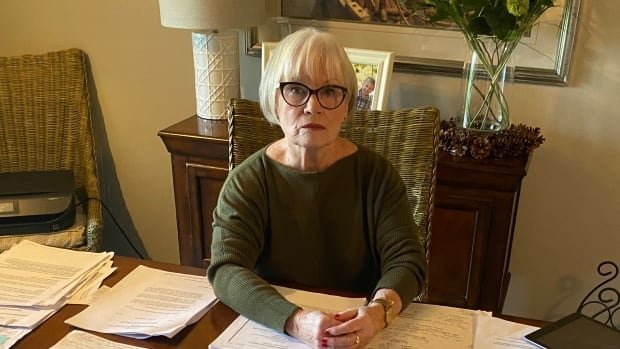When Sandra Commerford asked for a raise from a St. Catharines, Ont., hospital in 1998, the registered practical nurse (RPN) was confident she had a strong, open and shut case.
Commerford and upwards of 100 other RPNs had started administering medication to patients — a new responsibility that required months of additional training, transformed the job and should have translated to higher wages, Commerford said.
Over a quarter of a century later, she’s among dozens of other practical nurses who are still waiting for compensation.
“I was an excellent nurse and I loved my job,” Commerford told CBC Hamilton.
“But it was very difficult knowing every day we were being denied equal pay.”
At age 71 and retired, Commerford said she could be owed tens of thousands of dollars in back pay from her former employer, Niagara Health.
Her case hinges on the fact Niagara Health and Service Employees International Union (SEIU) Healthcare have yet to reach a pay equity agreement, as required under Ontario law.
Public-sector employers like hospitals must follow the province’s Pay Equity Act, which came into force in 1988, to avoid gender discrimination when setting wages for employees. Private-sector employers with more than 10 workers are also required to follow the act.
The wages of as many as 1,000 SEIU members working for Niagara Health are likely impacted, including practical nurses, personal support workers, and housekeeping, hospitality and clerical staff, said RPN Christine Peacock, 60, who used to sit on the union’s pay equity steering committee and works for the hospital system.
After a pay equity agreement is set, an employer reviews the wages of workers in jobs dominated by women — like practical nursing — to the wages of workers in jobs dominated by men with similar qualifications and responsibilities. If the female-dominated sector earns less, the employer is required to increase those workers’ compensation.
“The Pay Equity Act is intended to eliminate the wage gap that exists due to the undervaluation of what is typically thought of as ‘women’s work,'” says the province’s interpretation of the act.
Employers are also required to retroactively compensate current and former workers, and may be ordered to pay interest, says the pay equity office’s website.
A gender pay gap persists across all jobs in the country, with women earning 29 per cent less than men annually, according to Statistics Canada.
Niagara Health, union say they’re working on it
For decades, the jobs of SEIU members haven’t been reviewed to ensure RPNs are being paid fairly — a delay the Pay Equity Tribunal described in 2023 as “unacceptable and inexcusable,” but that still persists.
Niagara Health told CBC Hamilton in a statement that it acknowledges its obligations and continues to work on an agreement with SEIU.
It declined to comment further because it’s an “ongoing legal matter.”
SEIU Healthcare said its committed to reaching an agreement to close all gender wage gaps and described the process as “flawed.” The legislation lacks enforceable timelines to hold employers accountable, said the union’s statement to CBC Hamilton.
“Despite systemic delays and attempts to deny health-care workers pay equity, our union has never stopped advancing the work and we won’t stop until workers get what they’re owed.”
The statement said the union expects an agreement will be reached in the “near future,” but retroactive to 2009 — not 1998 when Commerford first applied for a raise on behalf of all RPNs, or 2000 when Niagara Health was formed.
Commerford reached out to CBC Hamilton this month out of frustration after another setback, she said. The two sides recently cancelled arbitration hearing dates — set over a year ago — despite still not having an agreement in place.
She’s concerned she’ll never see the raise in her lifetime.
“I have a daughter and I have a granddaughter, and I don’t want them to have to fight this fight,” Commerford said.
“It’s ridiculous. It’s just absolutely absurd.”
Agreement could cost millions
Neither the union nor the hospital system answered CBC Hamilton’s questions about how many staff could get a raise through a new pay equity agreement or the possible total cost. However, the SEIU said in a tribunal hearing document in 2019 that Niagara Health wanted to budget $3 million, while the union estimated it would cost more than $20 million.
The Ontario Nurses’ Association, representing registered nurses, is also still working on a separate pay equity agreement with Niagara Health, said spokesperson Meg Shannon. She said the union was “not able to go into specifics” about how long the process has taken so far and how many employees could be impacted.
It’s to the detriment of the whole organization to have this thing keep going and going, and not pay employees what their skills demand.– Audra Bowlus, labour studies professor, Western University
The Ontario Public Service Employees Union (OPSEU), representing a range of Niagara Health workers, did not respond to a request for comment on the status of its agreement.
Pay equity agreements, which involve both sides agreeing to complicated matrixes, do often take time, said Audra Bowlus, a labour studies professor with Western University in London.
But Bowlus said she was “shocked” by the length of delay at Niagara Health and isn’t aware of any other cases that have taken that long.
“It [the lengthy delay] basically says you don’t have to abide by the pay equity legislation,” she said.
“It’s to the detriment of the whole organization to have this thing keep going and going, and not pay employees what their skills demand.”
RPN wages haven’t kept up: association
Peacock resigned from the SEIU’s pay equity steering committee in 2019, saying it was due to a lack of progress and she felt the SEIU had let her and her colleagues down.
“I believed in the process and wanted to ensure all women were treated equally,” said Peacock.
“I feel let down, frustrated and disappointed that it has taken 24 years.”

Peacock worked with Commerford at the St. Catharines hospital in the 1990s when they were trained on administering medicine to patients.
During that time, the role of RPNs across the province “tremendously changed,” requiring more education and training than before, said Dianne Martin, CEO of Registered Practical Nurses Association of Ontario.
“Things kept getting added but the responsibility of giving medications was very large,” said Martin, a former RPN herself.
Their pay, however, didn’t keep up, Martin said.
Commerford and Peacock said they were never offered a raise, so Commerford made the request herself.
In response, the hospital and union signed an agreement in 1999 that acknowledged the job duties of practical nurses had changed and their pay would need to be reviewed — but after amalgamation.
Commerford provided a copy of the agreement to CBC Hamilton.
The two sides promised they would decide on a new pay equity agreement, which would determine how much practical nurses should be paid. In the meantime, they were given a raise of $1 per hour.
Delay ‘not in spirit of the act,’ tribunal says
Commerford carried on with her career and raised two children as a single parent. But by 2018, she said, her patience wore out and she filed a complaint with the Ontario Pay Equity Hearings Tribunal, which decides pay equity disputes.
She argued SEIU and Niagara Health had violated the act by not moving with urgency to solve pay “discrimination.”
SEIU backed Commerford’s position that her complaint be heard by the tribunal, but argued it wasn’t relevant because they were on track to reach an agreement.
The tribunal dismissed Commerford’s application in 2023, siding with Niagara Health that it was “premature” because a pay equity agreement wasn’t yet in place and therefore there was nothing to dispute.
However, the tribunal was critical of the delay, outlining years of reviews and hearings with no end in sight.
As of January 2023, over 500 out of 1,050 “ratings” were still in dispute, the tribunal noted. Ratings are the highest level of compensation for a job class, according to the pay equity office.
“It should not be the case … that employees in female job classes should be concerned that it will ultimately be their estates that will receive any pay equity adjustments,” the tribunal decision said.
“The delay in this case is simply not compliant with the spirit or intent of the act.”

